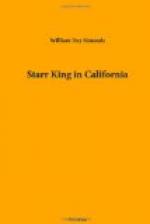James G. Blaine, whose history of the time must be regarded as impartial so far as California is concerned, makes this statement:
“Jefferson Davis expected, with confidence amounting to certainty, and based, it is believed, on personal pledges, that the Pacific Coast, if it did not actually join the South, would be disloyal to the Union.”
This beyond reasonable doubt was the situation in the Spring of 1860: Our immense State with its coast line of more than seven hundred miles, sharply divided as between Southern and Northern California; the majority of our people in Los Angeles and neighboring counties frankly favoring the proposed confederacy of slave-holding states; many of the larger towns in the San Joaquin and Sacramento valleys of a similar mind; the political leaders of the State almost solidly Democratic and the majority with strong Southern leanings; many of our foremost men believing that the time had come to launch the long dreamed of Pacific Republic, and our ranches and mines containing a large population either hostile or indifferent to the cause of Union and Liberty. Over against these varied forces a probable patriotic majority scattered from one end of California to the other, some belonging to the new Republican Party and some to the Douglas Democracy, and many without party affiliation, unorganized, badly scattered, and now that Broderick was dead and Colonel Baker away, without competent leadership. If ever a situation called for a man who might at once command the confidence of the people and arouse the latent patriotism of our wide-spread population, a man who might do the work of years in a few months’ time, who might in his own persuasive personality become a center of patriotism around which Union-loving men of all parties, and of no party, could unite in defense of the imperilled country; one unfettered by old antagonisms, or misled by personal ambition, a heaven-sent man destined to a work no other could accomplish — this the situation plainly demanded.
The record, impartially examined, shows, we believe beyond reasonable doubt, that California’s destiny in this critical hour was chiefly determined by the word and work of her patriot-preacher, Starr King.
Part III California’s Hour of Decision
The period that determined California’s attitude during the Civil War, coincides almost exactly with the first year and a half of Starr King’s residence in the State. Less than a month after he had preached his first sermon in San Francisco, Abraham Lincoln received the presidential nomination at Chicago, and the great debate was on.




